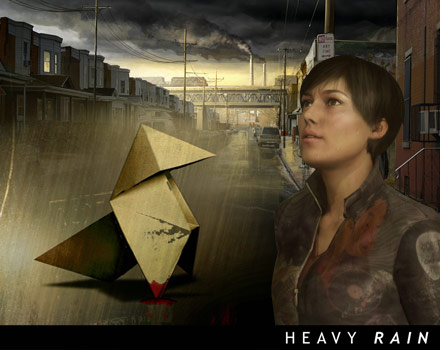 The so-called "motion gaming" hasn't been a reliable resource so far. The technical aspect seems to be ages ahead of the gameplay part, leading to games which may stupify initially only to disappoint in the long run.
The so-called "motion gaming" hasn't been a reliable resource so far. The technical aspect seems to be ages ahead of the gameplay part, leading to games which may stupify initially only to disappoint in the long run.That's the reason why casual gaming was born and the general audience has widened in recent years. The reason why there are just a few good games in this generation, and not plenty as it used to be.
In my first dissertation, entitled "Applications for WiiMote and perpspectives of use", in 2006 I analised the first games coming out on Wii. Mario Galaxy, Metroid Prime 3, Trauma Center, Wario Smooth Moves, Zelda: Twilight Princess. Some of them succesfully managed to create new gaming experiences, but to me that was disappointing as well since the elements added to the gameplay were not able to deepen how the game was enjoied.
In Metroid, for example, we could pull a lever by pulling the WiiMote towards us, and that was something new, but the consequences on that specific gameplay element were null, since we could have pushed a button instead without losing anything at all.
Hardcore players couldn't find any reason to prefer Wii to the HD consoles, and usually settled with one of those two, leaving Wii to the masses of casual gamers, even tough there are amazing games on Wii, too.
Anyway, Nintendo has had a big economic boost from this generation, allowing them to think about the future and develop new consoles like 3DS or the next WiiU. Economically, there are a lot of reasons to follow Nintendo in this new adventure, gaming-wise there shouldn't be many.
The new hardware, coming out at least a couple of years before the new Sony and Microsoft consoles, promises to be far from them in performance as it was the case with Wii, but there already are completed games for WiiU and the development kit is all over the gaming most important studios.
Crytek already declared to be elated with the WiiU dev kits, as well as Sega, while EA and other companies are helping Nintendo in estabilishing performing online features. UbiSoft have a game in store and many more to accompany the debut of the new console as it was with 3DS.
They shouldn't be that eager to jump on this train, given the way Nintendo treated Wii abandoning it in its prime, when games were needed to prolong Wii's lifespan to be technically realigned with the other hardware companies once this generation was over.
The reason which is pushing them is one game. Legend of Zelda: Skyward Sword.
Perfectly crafted, Z:SS is the classical game which could have been a masterpiece also on N64. There is nothing revolutionary in the gameplay. No Ico-like take on two characters story, no genre reinvention, no new impersonification measures. It just an action RPG, with the same greatness as the saga previous chapters, the same visionary stages and dungeons, the same secrets and enigmas.
Anyway, the sword Link brandishes seems to be the key to carry us over the storm of this flat generation into the next one. Thi WiiMote is used, for once, as a mean to enlarge pre-existing features rather than inventing new ones. Trivially, it is your sword. In the first dungeon the player can cut a spider web however he wants to, to pave his way through it. The first boss needs to be attacked from a specific point, depending on his stance, directing WiiMote in that particular fashion.
Multiply this for all the dungeons, all the creatures, all the enemies. You'll come up with thousands of ways to defeat villains, compared to one button of the past.
Gamers are, slowly, getting smarter, they will soon realise that too many games resemble each other. And the solution to this eventual behaviour is exactly what major companies are looking for in Nintendo. Finding the genius behind the constant progress of games. They want to jump on this train, they don't care about how many figures Nintendo can line up; that's just good for the japanese company.

Last summer I was preparing my other dissertation, on Kinect. When it came down to find something to program on it, I was taking into account too many options, and fortunately my teacher chose for me. That's basically what programmers do: they have this heck of a hardware and need to get a game out of it.
That is why motion control is always a couple of steps behind regular controls, the lack of previous gameplay engineering turned designers in newbies, finding a natural use of the peripheral instead of an "hardcore" one.
Anyway, you should be wondering why they didn't conceive something like Z:SS in the past, to crash opponents before they even came out with their consoles. That is easily explained by, again, the obviously poor experience they had at the time and the technological woes such devices undoubtedly have. With a first generation WiiMote, deeper games were impossible to develop for the low sensibility of the device which led to the infamous "shake-and-win" users behaviour; then, when WiiMote Plus came out, it was still needed some time to properly understand the input sent to the console, and how to tweak it into something playable. In a way, it seems like Nintendo has the edge over its opponents because this tweaking has been already made, and starting from Z:SS the only way is up while Sony and Microsoft are still fighting to find a suitable hardcore veil for their creations.
This is the edge third parties want to exploit, as if sales figures would represent where users want to go from now on. If hardcore gamers don't want motion sensing controllers anyway, it won't be possible to bridge the gap no matter what developers try to do. If they are open to this possibility, Nintendo will ride the wave at least until further generations, 20 years from now, will prove that motion gaming is not a stable innovation.










